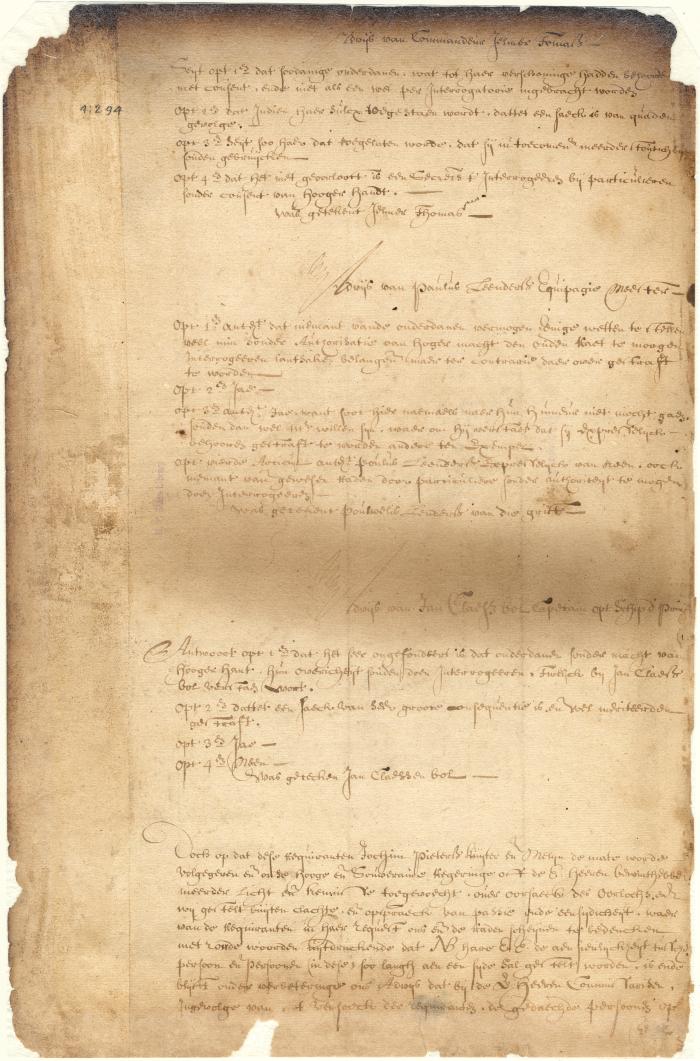Opinion of Commander Jelmer Tomasz
To the first, says that what such subjects had to offer in their defense ought to have been submitted by consent and not as a right by way of interrogatories. To the second, if they be allowed to do this, it will be a matter of evil consequence. To the third, says, if they be permitted to do this, they will hereafter show greater boldness. To the fourth, that it is not lawful for private individuals to question the secretary without consent from those in authority. Was signed: Jelmer Thomas.
The opinion of Paulus Leendersz, Superintendent of Equipments
To the first, answers no subject can make laws, much less interrogate the former council concerning public affairs, without authority from the superior power and that on the contrary they are liable to punishment for so doing. To the second, Yes. To the third answers, Yes, for should things hereafter not go to their liking they would then indeed wish to be master; wherefore it is his opinion that they ought to be decidedly punished as examples to others. To the fourth article, Poulus Leendersz expressly answers, No; also, that no member of the late council can be interrogated by private persons without authority. Was signed: Pouwelis Lendersz van die Grift.
Opinion of Jan Claesz Bol, captain of the ship De Princes
To the first answers, that, as Jan Claesz Bol understands it, it is without any foundation in law that subjects without authority from above should interrogate their superior officers. To the second, that it is a matter of very grave consequence and richly deserves punishment. To the third, Yes. To the fourth. No. Was signed: Jan Claessen Bol.
But in order that these petitioners, Jochim Pietersz Kuyter and Melyn, may receive full measure, that our supreme and sovereign government and the honorable directors may be furnished more light and information as to the cause of the war, and that we be safeguarded against complaints and all reproach of passion and partiality, whereof the petitioners in their petition seem to suspect us and the council, stating N.B. in plain words that their honors should herein for the time being set aside all distinction in rank between persons and persons; it is and remains our opinion, under correction, that the honorable commissaries, pursuant to the request of the petitioners, should hear the summoned persons on interrogatories and report their answers, in order to transmit these under cover to the honorable directors, without returning and showing them to the petitioners, unless they first make and prove some definite statements, squaring with their first petition and the apostil thereon, to wit, that they state categorically the motives and the causes of the war and give the names of those who have been the first authors and instruments thereof; furthermore, that they produce power of attorney from the honorable Lord of Nederhorst, whose name they use in their petition; also authority and power from the commonalty to remove the responsibility for the war from the latter, as they presume to do in their first petition. This being done and proved, a copy of the opinions of the honorable council may with the approval of the honorable council be granted them, provided they first show power and instructions from the honorable directors and the supreme and sovereign government and from the inhabitants of this country to procure any evidence respecting the war. And in default of sufficient documents and proof [ it is our opinion ] that they, together with the accused, [ should ] be sent to the fatherland to defend and substantiate their accusations and complaints before the supreme and sovereign government, as we are not commanded either by instructions from the honorable directors or orders from the supreme and sovereign authority to institute any inquiry therein, much less to pronounce definite judgment in the premises against the director and council or anyone else. Thus done in council at Fort Amsterdam in New Netherland, the l4th of June anno 1647. Was signed:
P. Stuyvesant, L: van Dincklaghe, H: van Dyck, fiscal, Jacob Loper, Jelmer Thomas, Pouwelis Lenders van de Grift and Jan Claesz Boll.
Teunis Andriesz from Amsterdam appeared before the council and requested an increase of his monthly pay, as he is now serving as pilot on De Liefde. Therefore, the honorable general and council allow him 26 guilders per month as wages, on condition that the increase shall commence when his term of service expires and if he binds himself then to serve again as pilot for two years for the aforesaid wages. The 14th of June anno 1647.
The chief pilot on board De Cat is allowed by the council 26 guilders a month, commencing [ blank ].
Whereas at present there is no provost and it is necessary to appoint a person to that office; therefore, Adam Roelantsz appeared before the council and requested the said appointment. To which office we, the director general and council appoint him hereby and order and command every one to leave him free and unmolested in the performance of his duties, for which service he, Adam Roelantsz, shall receive as wages 26 guilders and 100 guilders a year for board. The 14th of June 1647.
Rights: This translation is provided for education and research purposes, courtesy of the New York State Library Manuscripts and Special Collections, Mutual Cultural Heritage Project. Rights may be reserved. Responsibility for securing permissions to distribute, publish, reproduce or other use rest with the user. For additional information see our Copyright and Use Statement Source: New York State Archives. New York (Colony). Council. Dutch colonial council minutes, 1638-1665. Series A1809-78. Volume 4, page 294-295.



